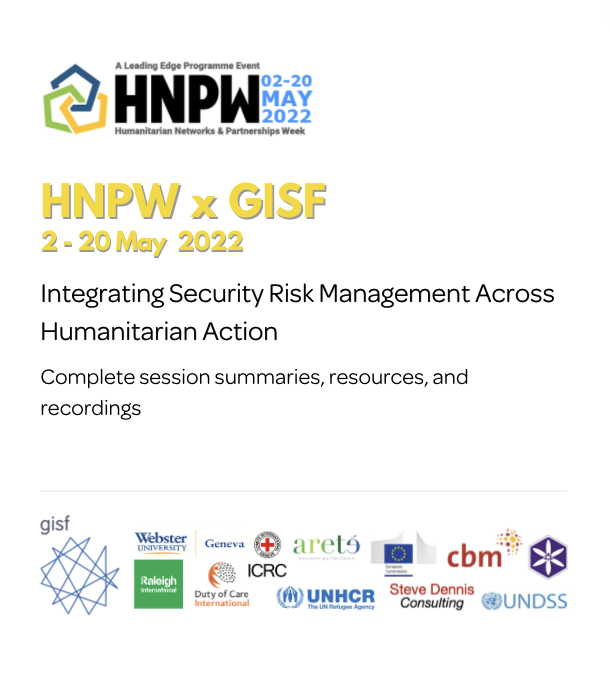Humanitarian Networks and Partnerships Weeks (HNPW)
The Humanitarian Networks and Partnerships Weeks (HNPW) is the annual event of the LEP (leading-edge programme) and the largest event of its kind. This year, the HNPW brought together more than 5000 experts in crisis preparedness and response from over 350 organisations and countries. The three weeks provided a collaborative space for practitioners and experts from a large variety of humanitarian stakeholders including UN agencies, NGOs, the Red Cross and Red Crescent movement, academia, the military, private sector initiatives, and Member States to collaborate in identifying solutions and solving common challenges in crisis preparedness and response. The event offers a space where LEP stakeholders meet annually to take stock, become inspired and build new coalitions.
The HNPW 2022 was held in a hybrid format from 02 to 20 May 2022 (02-06 May remote, 09-13 May face-to-face at the CICG in Geneva, 16-20 May remote). GISF hosted sessions across the whole three weeks.
HNPW & GISF
In 2022, now under the heading of Areas of Common Concern (AOCC), GISF continues to lead on Integrating Security Risk Management Across Humanitarian Action, as part of the HNPW. Bringing together experts from across the aid world, GISF co-hosted nine virtual and face-to-face sessions in partnership with different actors such as the UN, ICRC, CBM, Raleigh International, as well as independent consultants.
We welcomed all humanitarians to join our sessions and discuss how to keep aid workers safe and facilitate access to affected communities. SRM impacts all aspects of humanitarian action, and together, we will improve communication and coordination across the sector and identify how SRM must adapt to face current challenges.
This year’s GISF-led HNPW sessions were:
(1) Physical and Mental Wellbeing: Why an integrated approach to SRM is important,
(2) A Person-Centred Approach to Security Risk Management: Benefits and challenges,
(3) Building an Organisation Culture for Effective Security Risk Management: Exploring element of Duty of Care before, during and after incidents,
(4) Improving staff safety through effective donorship (private session),
(5) Fixing the blind spot: Private security contracting in the humanitarian sector,
(6) How Technology is Changing Security Risk Management in the Humanitarian Sector,
(7) Inclusive Security, balancing aspirations, and constraints,
(8) How does race and racism impact aid workers’ security?,
(9) Tackling Mis-information and Dis-Information in Humanitarian Response.
The session descriptions, additional resources and recordings are now available, and can be accessed in full detail by downloading the document on the left.
Below are links to the live session recordings for each session.
- A Person-Centred Approach to Security Risk Management: Benefits and challenges.
Speakers: Philipp Burtzlaff (CBM), Lisa Short (Areté Business Performance), Bridget Hancock (UNHCR) - Fixing the blind spot: Private security contracting in the humanitarian sector.
Speakers: Panos Navrozidis (GISF), Aurore Chare (NRC) - Building an Organisation Culture for Effective Security Risk Management: Exploring element of Duty of Care before, during and after incidents.
Speakers: Steve Dennis (Steve Dennis Consulting), Christine Williamson (Duty of Care International) - Fixing the blind spot: Private security contracting in the humanitarian sector.
Speakers: Panos Navrozidis (GISF), Aurore Chare (NRC) - How Technology is Changing Security Risk Management in the Humanitarian Sector.
Speakers: Lisa Short (Areté Business Performance), David Clamp (Raleigh International) - Inclusive Security, balancing aspirations, and constraints.
Speakers: J-P Kiehl (ICRC), Catherine Deseure Plumridge (UNDSS)
